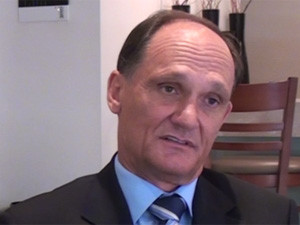
In what has been flagged as the start of the "headline battle of the year" in the mobile price war, Cell C has asked the Independent Communications Authority of SA (ICASA) to shelve the imminent interconnect rate cuts, until an "urgent market review" has been carried out.
The move comes as a surprise, considering Cell C CEO Alan Knott-Craig has long advocated lower interconnect - or mobile termination rates (MTR) - as a driver for competition in the market. Analysts have also pegged the capacity for a 99c tariff from Cell C on falling MTRs. The interconnect rate (MTRs) is what operators pay each other to terminate traffic on their networks.
As of 1 March, MTRs will drop to 40c (peak and off-peak), down from a high of R1.25 three years ago, when ICASA instituted the sliding scale that saw MTRs dropping by 16c annually.
Competitive scale
In a statement yesterday, Cell C said there needs to be significant further MTR reductions for the dominant players (Vodacom and MTN) on the one hand - and significant and sustained MTR asymmetry for smaller operators (Cell C and 8ta) on the other.
Cell C believes this is necessary, in order to increase competition and bring down the cost to communicate, "which will ultimately benefit consumers".
With considerably smaller market share, Cell C and 8ta have the benefit of asymmetrical MTRs, which means they can charge Vodacom and MTN up to a certain percentage higher for call termination. At the current MTR of 56c, for example, Cell C pays Vodacom and MTN 56c to terminate calls on their networks, but can charge them up to 64.4c to terminate traffic on Cell C's network.
According to ICASA, this rate was set at a maximum of 20% for 2011 to the month of March and 15% for 2012, in line with the MTR glide scale. This will be reduced by a further 5% on 1 March (next Friday), when the MTR glide scale comes to an end, reaching an all-time low.
World Wide Worx MD Arthur Goldstuck says the asymmetrical MTRs, introduced by ICASA in 2010, allow Cell C to play on the same level field as the rest for off-net calls.
Slim chance
In light of the looming interconnect cut and corresponding reduction in Cell C and 8ta's asymmetry benefit, Cell C says an urgent market review must be undertaken to determine the effectiveness of the call termination regulations, and whether they have in fact had the desired effect of reducing the cost to communicate in SA.
"We have asked ICASA to retain the current MTR levels pending the outcome of this urgent market review, because we are concerned that if the MTR drops to the proposed 44c rate for mobile operators, without significant market power on 1 March, then the ratio of asymmetry that smaller operators require to compete effectively with the dominant incumbents will not thereafter be realised."
But industry experts say Cell C's request is unlikely to be heeded by ICASA, which is under huge pressure - from the industry and consumers alike - to follow through on its commitments.
Curious call
Ovum's emerging markets analyst Richard Hurst says Cell C's urgent review request seems anomalous and "haphazard".
"In the past we have seen Knott-Craig pushing for lower interconnect, so this [request from Cell C] seems strange." Hurst says, while it is all good and well to enable the smaller players, trying to stop the planned interconnect drop from going ahead next week is unlikely to succeed, and Cell C's attempt comes across as "a bit of a rushed job".
Hurst says ICASA needs to be following through on what it set out to do. "Any deviation will not go down well with the industry or the public."
Goldstuck says Cell C's call for ICASA to hold off on dropping MTRs is counter to the position the operator has had all along in the interconnect debate.
He says, while he understands where Cell C is coming from, the result in this case is unlikely to be in the company's favour. "I can see where [Knott-Craig] is going. There will be less room to play in terms of pricing, if others are on a similar regime - but you can't have your cake and eat it."
Casualty of war
Hurst questions whether the sudden move by Cell C may not perhaps be a "casualty of the price war".
He says it may be based on a realisation that the price cuts that have been initiated, since last year when Cell C instigated the mobile price war, have to be balanced.
"If you look at price cuts in terms of tariffs, you are dealing with the wholesale rate, rather than the resale rate. While wholesale rate cuts are supposed to be passed down to end-users, it does not necessarily pan out that way. Tariffs have to be rebalanced and cleared by ICASA before being passed."
Dominic Cull, regulatory advisor for SA's Internet service providers' industry body, says the move by Cell C is likely to spark what will be the "headline battle of the year", which will see Cell C and 8ta on one side - and Vodacom and MTN on the other.
SA's duopoly, says Cull, will strongly oppose Cell C's call for asymmetry, while the smaller operators will play the previously disadvantaged card. He says Cell C will argue that Vodacom and MTN had an advantage from the start. "Cell C argues that Vodacom and MTN were massively subsidised by Telkom, because of fixed-line interconnect rates.
"Alan Knott-Craig wants asymmetry, and he wants it aggressively."
Share